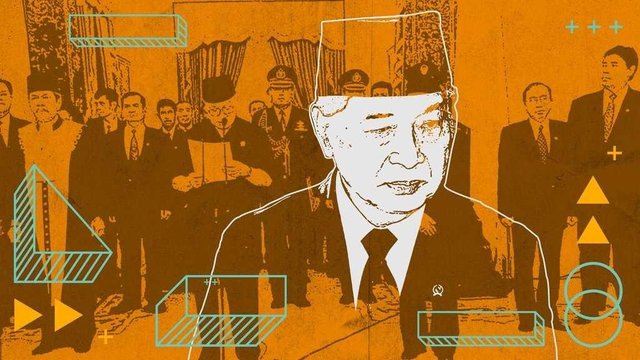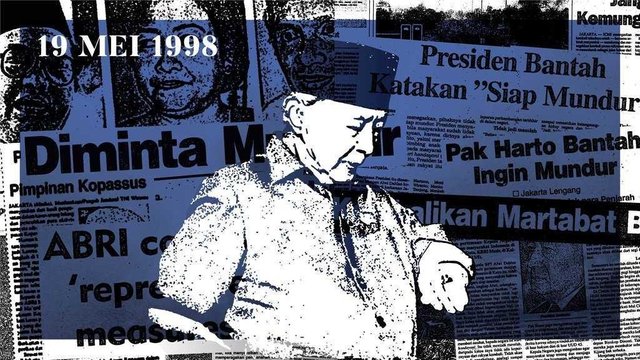#AFStory Ginandjar Maneuvers Accelerate the Fall of Soeharto

Foto : Ilustrasi/tirto.id
At noon, May 20, 1998, just today 20 years ago, Haryanto Dhanutirto went by car in a hurry to the office of the National Development Planning Agency (Bappenas). The Minister of State for Food, Horticulture, and Drugs is meeting the call of Coordinating Minister for Economic, Finance and Industry (Coordinating Minister for Economy) Ginandjar Kartasasmita.
"You are asked to be present at Bappenas," said Haryanto's aide some time before.
On the way to Bappenas, Haryanto saw tanks marching around the home of the US ambassador. The tanks also lined the roundabout in front of Taman Surapati, just in front of the Bappenas office.
"I immediately turned right and entered the office of Bappenas," said Haryanto through a collection of testimonies gathered in the book Last New Order Cabinet Meeting (2008).
Jakarta when it was really tense. Within a week, massive protests demanding that Suharto step down from his position to increase, even to the chaos.
On May 12, 1998, four Trisakti University students died while participating in a protest. Throughout May 13-15, 1998, several buildings and shopping centers in Jakarta were looted and burned. In the riots, Chinese people were targeted. They were killed and many women were raped. Various unrest also hit several major cities such as Surakarta, Bandung, and Palembang.
Then, on May 18, 1998, thousands of students occupied the DPR / MPR building. They demanded reform and urged Suharto to file accountability and resign from the presidency he had held for 32 years.
On the same day, the House leadership signed a statement essentially asking Suharto to resign. Then, on May 19, 1998, it was the turn of 9 Muslim leaders who were seen critical of the New Order government, namely Nurcholish Madjid, Abdurrahman Wahid, Achmad Bagdja, Ma'ruf Amin, Malik Fajar, Ali Yafie, Sumarsono, Cholil Baidowi and Emha Ainun Najib , asked Suharto to resign. The statement was delivered directly to Soeharto at the Merdeka Palace.
When the state's financial situation is no longer conducive, the House no longer supports it, and various groups are urging it to resign, what does Suharto want?
He wants to remain president. He argued that he would shuffle the composition of his cabinet (reshuffle) and form a Reform Committee.

Foto : Ilustrasi/tirto.id
Ginandjar Maneuvers
At Bappenas, Haryanto is not alone. There are a number of other ministers, especially those dealing with economic issues, present at the call of Ginandjar.
In Managing Indonesia's Transformation: An Oral History (2013), Ginandjar wrote the ministers' meeting he made after a number of ministers, businessmen and journalists visited his home on May 20, 1998 morning. During the visit, Akbar Tanjung, Kuntoro Mangkusubroto, A.M. Hendropriyono, Arifin Panigoro, Zainal Arifin, Uni Lubis, and Iwan Qodar present conveyed how vulnerable the Indonesian political situation.
"The tragedy of the Tiananmen tragedy faded in our conversation, and I decided to make ministerial meetings in charge of the economy during the day," Ginandjar said. Tiananmen referred to the People's Republic of China (RRT) in 1989. At that time about 10,000 people were killed in a demonstration against the Chinese Communist government.
All the ministers in charge of the economy attend Ginandjar's summons. There are only three ministers who can not attend, namely Environment Minister Juwono Sudarsono, Industry and Trade Minister Bob Hasan, and Finance Minister Fuad Bawazier. Due to the absence of the Finance Minister, Ginandjar invited the Governor of Bank Indonesia Syahril Sabirin.
Ginandjar opened the meeting at Bappenas, again, by discussing the current economic situation in Indonesia. Ministers report the situation faced by the agency.
Bank Indonesia Governor Syahril Sabirin conveyed that Bank Indonesia (BI) has been closed for two days because the building is inaccessible to employees. Syahril speculated, if BI continues to stagnate in a week, Indonesia's economy will collapse.
To Haryanto, Ginandjar also asked about food supply. "Mr. Haryanto as the minister of food, if in this condition, there is a blockade everywhere, when will the food supply run out?" asked Ginandjar.
Haryanto replied, "Two weeks of food supplies in Jakarta will be exhausted if there is no supply."
Later, Ginandjar talked about the cabinet reshuffle that Soeharto proclaimed. The man who was born on 9 April 1941 said he would refuse if Soeharto invited him to join the cabinet.
"Why? Because it will not solve the problem, instead, it will confuse the atmosphere," said Ginandjar.
A little later, each minister declared the same. Haryanto is one of them. Professor of ITB's pharmacy school stated there is a possibility he will not be elected as minister in the cabinet reshuffled results.
"Well, willingly, whoever is willing, it will not come back Mr. Ginandjar said that from
"Well, who is willing, it will not come back, Mr. Ginandjar said that from these ministers no one gives a statement, so we have the ministers will make their own statement," said Haryanto.
In all, there were fourteen ministers who at the meeting at the Bappenas refused to join the Soeharto-led Reform Cabinet. In addition to Ginandjar and Haryanto, they are members of Golkar such as Akbar Tanjung (State Minister of People's Housing and Settlements) and Theo L. Sambuaga (Minister of Labor), military groups such as A.M. Hendropriyono (Minister of Transmigration and Forest Squatter Settlement), or technocrats such as Tanri Abeng (State Minister of State Owned Enterprises), Giri Suseno Hadihardjono (Minister of Transportation), and Kuntoro Mangkusubroto (Minister of Mines and Energy).
The other six ministers are Justika S. Baharsjah (Minister of Agriculture), Rachmadi Bambang Sumadhijo (Minister of Public Works), Rahardi Ramelan (Minister of Research and Technology / Head of BPPT), Subiakto Tjakrawedaya (Minister of Cooperatives and Small Entrepreneurs), Sanyoto Sastrowardoyo (Minister Investment Country / Head of BKPM), and Sumahadi (Minister of Forestry and Plantation).
However, not all attendees at the meeting agreed with Ginandjar's position and the newly ordained ministers of 16 March 1998. Syahril declared his position non-political so as not to deign to express his attitude. Meanwhile, Ary Mardjono (State Minister of Agrarian Affairs / Head of BPN) said that he remained loyal to Soeharto.
"He (Ary Mardjono) is known to be close to Mbak Tutut, the eldest son of President Soeharto Ary Mardjono did not say anything during the discussion The response he gave during the meeting only asked to be allowed not to sign the statement.I respect the position of both and so I told them , "said Ginandjar assess the position of Syahril and Ary.
After the agreement was reached, the fourteen ministers decided to submit a statement of their attitude through a letter to Suharto. Akbar Tanjung led the drafting of the statement.